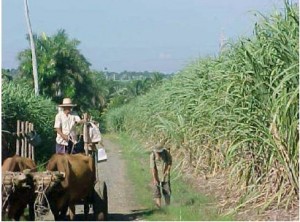The roots of sugar cane were brought to Cuba from the Canary Islands by Christopher Columbus on his second voyage, in December 1493. Planted in the fertile soil Cuban, rain, sun and great weather soon made the plant will take root and around 1501 came the first property Canaveral Pedro de Atienza.
Initially the juice was extracted by manual means. Father Bartolomé de las Casas said that in 1506 the Catalan Miguel Ballester began to extract the juice or “cane juice” through one instrument called “cunyaya” or lever press. The first mill was built horse Don Gonzalo de Velosa. These rudimentary mills were also called “freshmen”.
In the Elegies of Juan de Castellanos appears this couplet: “The first inventor of this thing, / who first gave perfected, / They say it was Gonzalo de Velosa, / male estimated by good hand.”
In time and with the advent of steam boilers came the “geniuses”. Fernando Ortiz says that wit by saying that “industry, skill, or artifice.”
With the development of technology came the ultra powerful mills, which became known as “central”.
Since the discovery, the sugar industry was linked to the history of Cuba. His triumphs and failures left indelible mark on the history and character of the Cubans. If the sugar industry was going fine time of “good times”. Conversely, if the sugar industry was going wrong then we were in time of “lean”.
When in 1944 President Grau reached an agreement advantageous prices for sugar that we sold to the United States, there was the so-called “Differential Sugar”, a period of plenty of grateful remembrance. When each had five Cuban pesos in his pocket, he said Grau.
When some years ago Castro’s government announced the elimination of the Cuban sugar industry now is time to remember that famous phrase that became an axiom among Cubans: “No sugar, no country.”
Sources: RecuerdosdeCuba/AdPuello/internetPhotos/www.thecubanhistory.com
Cuban Axiom: No Sugar, No Country
The Cuban History/ Arnoldo Varona, Editor
Sin azúcar no hay país
Las raíces de la caña de azúcar fueron llevadas a Cuba desde las Islas Canarias por Cristóbal Colón en su segundo viaje, en diciembre de 1493. Plantadas en las fértiles tierra cubanas, las lluvias, el sol y las magníficas condiciones climáticas pronto hicieron que la planta se enraizara y hacia 1501 surgió el primer cañaveral propiedad de don Pedro de Atienza.
Al principio se extraía el guarapo por medios manuales. El Padre Bartolomé de las Casas dice que en 1506 el catalán Miguel Ballester comenzó a extraer el guarapo o “zumo de la caña” por medio una instrumento llamado “cunyaya” o prensa de palanca. El primer trapiche de caballos lo construyó don Gonzalo de Velosa. A estos rudimentarios trapiches también se les llamaba “cachimbos”.
En las Elegías de Juan de Castellanos aparece esta copla: “El inventor primeros de esta cosa, / Que primero lo dio perfeccionado, / Dicen que fuese Gonzalo de Velosa, /Varón por buena letra estimado”.
Andando el tiempo y con la aparición de las calderas de vapor surgieron los “ingenios”. Dice Fernando Ortiz que se decía ingenio por decir “industria, maña o artificio”.
Con el desarrollo de la tecnología surgieron los ingenios ultra potentes, que pasaron a llamarse “centrales”.
Desde el descubrimiento, la industria azucarera estuvo ligada a la historia de Cuba. Sus triunfos y fracasos dejaron huella indeleble en la historia y en el carácter de los cubanos. Si la industria azucarera iba bien era época de “vacas gordas”. Por el contrario, si a la industria azucarera le iba mal entonces estábamos en época de “vacas flacas”.
Cuando en 1944 el presidente Grau logró un ventajoso acuerdo de precios para el azúcar que vendíamos a los Estados Unidos, se produjo el llamado “Diferencial Azucarero”, un período de vacas gordas de grata recordación. Cuando cada cubano tenía cinco pesos en el bolsillo, según decía Grau.
Cuando se anuncia la eliminación de la industria azucarera cubana es hora de recordar aquella famosa frase que llegó a ser un axioma entre los cubanos: “sin azúcar no hay país”.
Sources: RecuerdosdeCuba/AdPuello/internetPhotos/www.thecubanhistory.com
Cuban Axiom: No Sugar, No Country
The Cuban History/ Arnoldo Varona, Editor




